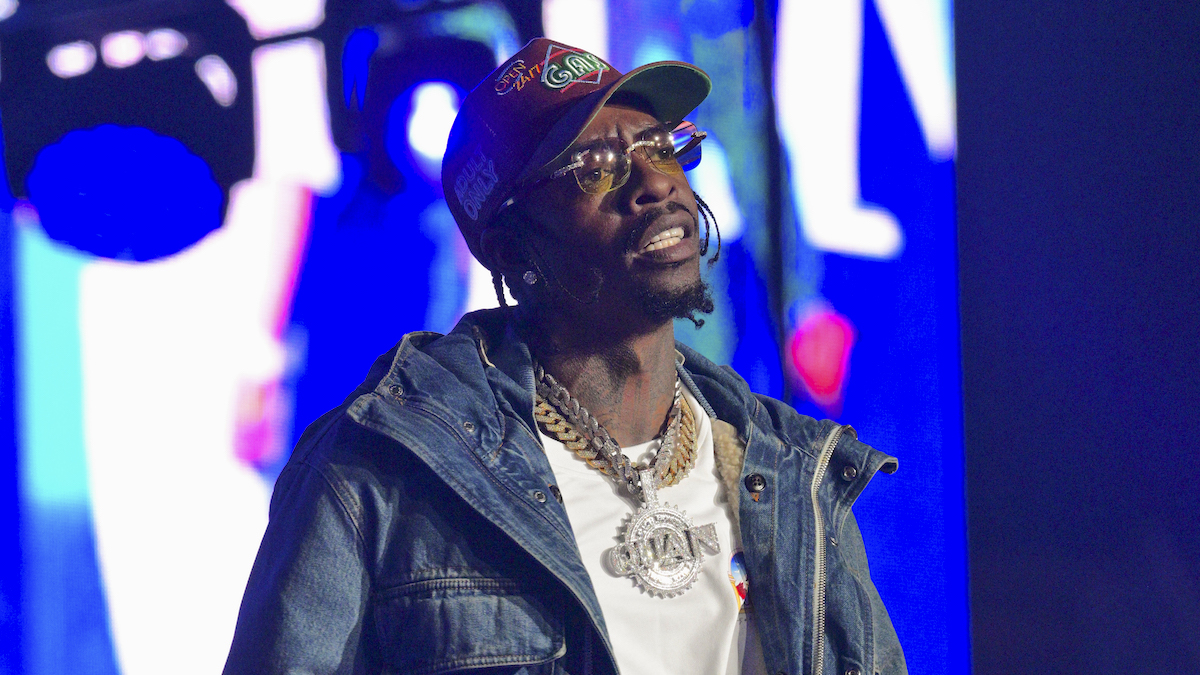Feeling a ‘Type of Way’: The death of Rich Homie Quan and foreclosed futures of Black men

In an unfortunately common turn of events, the Black and hip-hop communities have lost two more notable figures in the span of a week—each before the age of 60.
Rich Homie Quan, the Atlanta rapper best known for hits “Flex (Ooh, Ooh, Ooh)” and “Type of Way,” died Thursday at the age of 34. Born Dequantes Devontay Lamar, the rapper’s death was confirmed by the Fulton County Medical Examiner. He had made his mark with a slurry signature flow and catchy hooks while collaborating with artists like Gucci Mane, 2 Chainz, and friend-turned-rival Young Thug.
News of Quan’s demise arrived after another tragic passing. Fatman Scoop (born Isaac Freeman III) collapsed on stage during a performance at Town Center Park in Hamden, Connecticut, at the age of 56. Known for his infectious energy and iconic voice on stage and numerous hit records, he was rushed to the hospital but would not survive.
Neither had specific explanations given for their deaths, but in America, existing a Black person is more than enough.
A foreclosed future
These losses are not isolated incidents but part of a more significant, troubling trend—even the word “trend” seems inappropriate. The premature deaths of Black men in America, including those within the hip-hop community, highlight what Nina Harawa wrote was a “silent epidemic” that has been plaguing the country. More hauntingly, their deaths underscore a grim truth: For Black men, the promise of a long life appears to be a future perpetually out of reach.
The concept of a “foreclosed future,” as late cultural theorist Mark Fisher described it, has always hung like dark specters over the Black community. It is as if being Black in this country comes with a known cost and an unspoken caveat—a future of longevity and good health that is constantly hinted at but rarely fully realized. There is obviously no guarantee anyone will make it to retirement age, but there is even less of a guarantee if you were born Black.
Dr. Italo Brown, a clinical assistant professor of emergency medicine at Stanford University, described to Capital B News the health risks facing Black men as a “gumbo mix of risk.” For rappers (and likely other notable Black men), these risks are compounded by the pressures of creating art in the public eye, punishing schedules, and the wealth they are unprepared to deal with. But beyond industry-specific factors lies a more insidious truth—a system that seems designed to deny Black men the future they deserve.
The tale of the tape
The evidence is clear—studies have shed light on the disturbing state of Black men’s health in this country:
- According to a 2023 JAMA study, the higher mortality rate among Black Americans resulted in 1.63 million excess deaths (and “more than 80 million excess years of life”) compared to white Americans over more than two decades (between 1999 and 2020.
- Life expectancy for non-Hispanic Black males plummeted by three years during just the first half of 2020 (during the COVID-19 pandemic), the most significant drop of any racial or ethnic group studied.
- Even before the pandemic, the average life expectancy of Black men was five years shorter than that of White men and a decade shorter than the life expectancies of women overall.
These statistics aren’t just numbers; they represent lost potential, perpetually unrealized dreams, and a future continually deferred not just for the dead but for their loved ones and offspring.
While death by gun violence and drug overdose make for eye-catching headlines, what’s often missed are the ways Black men are disproportionately vulnerable to death due to chronic conditions, such as cancer, heart disease, stroke, and diabetes (which Scoop had).
Mark Anthony Neal, chair of the Department of African & African American Studies at Duke University, notes, “Premature death—often from chronic illnesses that can be prevented—is a reality for Black men whether or not hip-hop is in the room.” Neal speaks to a broader cultural and literal haunting, the persistent specter of early death that looms over Black communities.
These deaths destroy family connections, and they become exponential in effect. For example, Quan is survived by four children, who will not have their father for guidance, protection, and assurance. This lack can become generational, carrying over to their children and so on.
Stress, depression, and drug addiction are also increasingly significant in the silent demise of many Black men. A 2021 JAMA study revealed that Black men had a more considerable increase in suicide attempts in relation to other racial groups. The study found that suicide rates in Black male adolescents had increased by 47% from 2013 to 2019—before the pandemic.
Roles and factors
The shortened life trajectories of Black men are not only the result of individual choices but those choices are being made from within a grinding system, creating a feedback loop that aims to kill them. Consider the history of food deserts, police malfeasance, scarcity of green spaces, lack of educational and professional opportunities, and a long and well-documented history of medical racism. These factors contribute to this loop, reinforcing the likelihood of foreclosed futures.
Earlier this year, in a positive step, a group of hip-hop legends, including Fat Joe, Public Enemy’s Chuck D, and Busta Rhymes, joined in a public service announcement calling for price transparency in health care. Rapper/entrepreneur Nasir “Nas” Jones launched the Paid In Full Foundation to help financially support hip-hop’s pioneers. These efforts represent a desire to wrestle for control of a future that has long seemed out of reach.
These actions, and many others, can work towards a future where Black men can live long, healthy lives, whether they be rappers or laypersons. In doing so, we challenge Fisher’s foreclosed futures and compose new narratives—the ability to dream new dreams—where the promise of longevity can someday become a reality for Black men across America.
Have a tip we should know? tips@themarysue.com